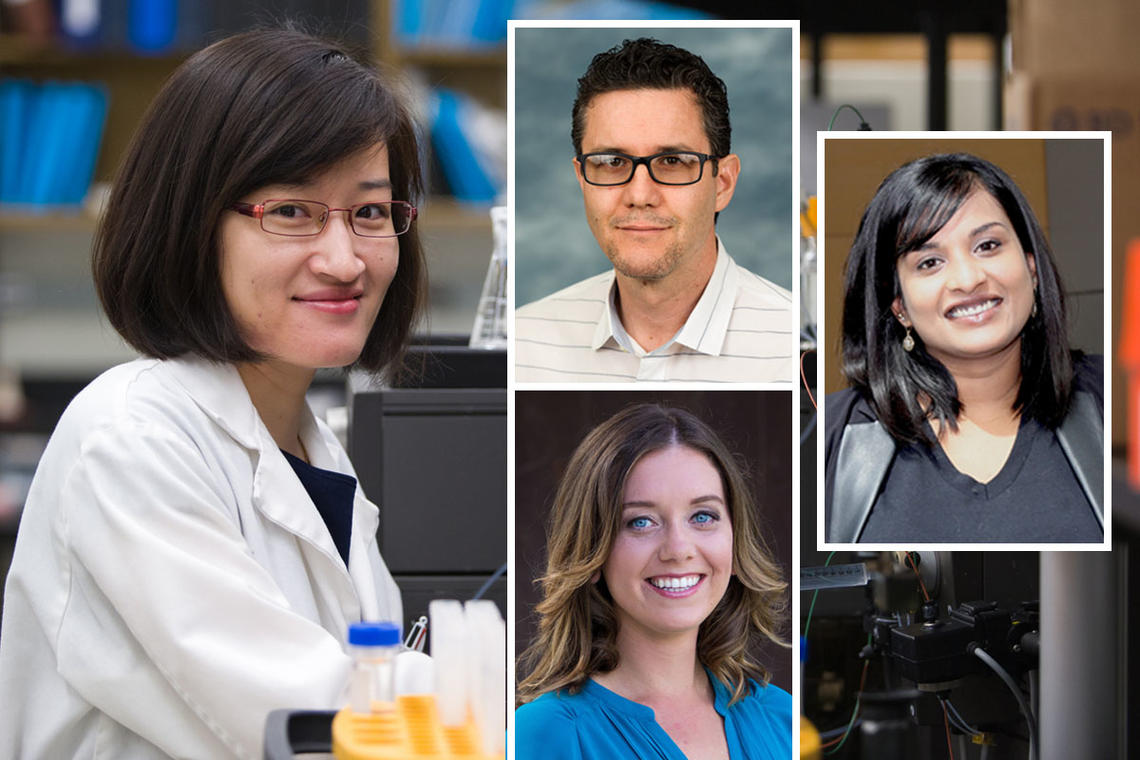Oct. 4, 2016
Four UCalgary postdocs awarded Banting Fellowships

From top left: Kun Shao, Adalberto Loyola-Sanchez, Ajitha Thanabalasuriar, and Agnieszka Zurek.
Riley Brandt, University of Calgary
Four University of Calgary postdocs have received 2016 Banting Postdoctoral Fellowships, an award among the most prestigious for postdocs in Canada.
Adalberto Loyola-Sanchez, Kun Shao, Ajitha Thanabalasuriar, and Agnieszka Zurek were awarded Banting Fellowships this year on the basis of their research excellence, to support them as they continue to build their promising careers under the mentorship of research leaders, and learn to become leaders themselves.
“The Banting Postdoctoral Fellowship enables the University of Calgary’s to recruit exceptional scholars like Alberto Loyola-Sanchez, Kun Shao, Ajitha Thanabalasuriar, and Agnieszka Zurek,” says Naweed Syed, scientific director of the Alberta Children’s Hospital Research Institute. “We are pleased to provide them with a rich research environment and put them elbow-to-elbow with other leading scientists, which fuels truly transformative discoveries.” Syed, postdoctoral program director from 2013 to 2016, provided mentorship and support for candidates applying for Banting Fellowships.
- Adalberto Loyola-Sanchez: "Sustainability in Arthritis Management Programs for Indigenous Populations of Canada and Mexico"
Loyola-Sanchez is researching how to increase the sustainability of community-based interventions for improving health and quality of life of people living with arthritis in Indigenous communities in Canada and Mexico. He is part of Dr. Cheryl Barnabe’s team in the departments of Rheumatology and Community Health Sciences in the Cumming School of Medicine. Barnabe is also a member of the O’Brien Institute for Public Health, and the McCaig Institute for Bone and Joint Health.
Loyola-Sanchez is assessing arthritis models of care to determine if they are responding to community needs, aligning with the interests of community stakeholders, and successfully achieving their goals. His work with members of the Mayan Municipality of Chankom in Yucatan, Mexico, and the Siksika Nation in Alberta, has opened his eyes to the complexity of health and wellness, challenging his biomedical assumptions about health.
“Learning about Indigenous people's way of life as a non-Indigenous individual has made me more open to alternative ways of knowing and valuing life,” he says. “It is amazing to understand that to be well and healthy is not just a matter of having a healthy body, but also a sound mind, balanced emotions and strong spirit.”
- Kun Shao
- Ajitha Thanabalasuriar: "Employing Intravital Microscopy to Understand Immune Cell Dynamics During Inflammation"
Thanabalasuriar uses in-vivo imaging of the lungs of mice to visualize immune processes in real-time. This process, known as intravital microscopy, enables Thanabalasuriar to understand how specific immune cells behave after infection, deepening her understanding of the lung’s response to inflammation.
As part of Dr. Paul Kubes’ lab in the Snyder Institute for Chronic Diseases, Thanabalasuriar has access to the cutting-edge microscopy techniques required for her work, as well as collaborative research opportunities. During her time at the University of Calgary, she has worked with academic labs, industry partners, and local educators to further her research objectives and share her findings with the public.
“The most rewarding part of my work is being able to educate new scientists, while working in a team environment to further medical innovations,” she says. “By understanding how specific immune cells mediate disease in the lung, we can potentially develop therapeutics that target lung-specific issues with fewer side effects.”
- Agnieszka Zurek: "Plasticity of GABA Synapses in Hypothalamic Circuits: A New Model for Post-Traumatic Stress Disorder"
Agnieszka Zurek’s research focuses on how a major stressful event can cause sustained changes in the brain. In normal brains, inhibitory neurotransmission "puts the brakes on" a response to stress. However, recent research has shown that after a major stressor, the brakes may fail and the system can become hyper-responsive to subsequent events. This results in an exaggerated stress response and anxiety.
“My project examines how changes to the brain’s inhibitory system effectively form a ‘memory’ of a stressful event,” Zurek explains. “My goal is to determine whether it is possible to interfere with these changes to the brain’s inhibitory system, and prevent hyper-responsiveness to subsequent stressors.”
Zurek is part of Jaideep Bains’ lab in the Department of Physiology and Pharmacology in the Cumming School of Medicine. Bains is part of the Hotchkiss Brain Institute (HBI), which gives Zurek access to HBI’s cutting-edge labs, collaborative learning environment, and rich mentorship opportunities.
“Being able to test these ideas in the laboratory and discuss the results with my colleagues is extremely rewarding,” says Zurek.
The Banting Postdoctoral Fellowships program aims to attract and retain top-tier talent nationally and abroad and position them for success as the research leaders of tomorrow who will positively contribute to the country's economic, social and research-based growth. Funding for the awards is delivered through the Canadian Institutes of Health Research (CIHR), the Natural Sciences and Engineering Research Council of Canada (NSERC) and the Social Sciences and Humanities Research Council of Canada (SSHRC). Fellows are awarded $70,000 per year for two years.
The University of Calgary Postdoctoral Program attracts the best and brightest emerging scholars with world-class professional training that prepares them to pursue rewarding careers in industry, academia, government, and non-governmental organizations. Through the unique Eyes High Postdoctoral Scholars Competition, the university has invested in more than 185 postdocs, bringing the total number of postdoctoral scholars on campus to over 500, ranking the program among the top five in Canada.
